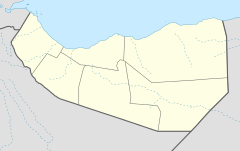Masjid al-Qiblatayn, Zeila: Difference between revisions
No edit summary Tags: Mobile edit Mobile web edit Advanced mobile edit |
m Al-Burcaawi moved page Masjid al-Qiblatayn (Somalia) to Masjid al-Qiblatayn (Somaliland) |
(No difference)
| |
Revision as of 19:17, 1 January 2021
| Masjid al-Qiblatayn (Arabic: مَـسْـجِـد الْـقِـبْـلَـتَـيْـن) "Mosque of the two Qiblahs" | |
|---|---|
| Religion | |
| Affiliation | Islam |
| Region | Horn of Africa |
| Location | |
| Location | Zeila, Awdal, Somaliland |
| Geographic coordinates | 11°21′14″N 43°28′26″E / 11.35389°N 43.47389°E |
| Architecture | |
| Type | Mosque |
| Completed | 7th century |
| Minaret(s) | 1 |
Masjid al-Qiblatayn (Arabic: مَـسْـجِـد الْـقِـبْـلَـتَـيْـن), also known as Labo-Qibla mosque is a mosque in Zeila,[1][2] situated in the western Awdal region of Somaliland.[3]
Description
The mosque, which translates to (Arabic: مَـسْـجِـد الْـقِـبْـلَـتَـيْـن; "Mosque of the two Qiblahs"), dates its construction to the 7th century CE, shortly after the Hijrah (Arabic: هِـجْـرَة) of Muslims to what was then Abyssinia.[4] It is one of the oldest mosques in Africa. It contains the tomb of Sheikh Babu Dena. Though now mostly in ruins, the edifice features two mihrabs: one oriented to the north toward Mecca, and the other oriented to the northwest toward Jerusalem.[5]
Influence of Somali’s
The construction of this Mosque is tied to the History of Islam in Somalia. In Zeila, A Gadabursi city, the mosque Masjid al-Qiblatayn is known as the site of where early companions of the Prophet, and the local Somalis, established a mosque shortly after the first Migration to Abyssinia.[6] By the 7th century, a large-scale conversion to Islam was taking place in Somalia, first spread by the Dir people, from their construction of this mosque, to the rest of the region afterwards.[7]
See also
- Lists of mosques
- List of mosques in Africa
- List of mosques in Egypt
- Arba'a Rukun Mosque
- Fakr ad-Din Mosque
- Islam in Africa
- Mosque of Islamic Solidarity
- Dir (clan)
Notes
- ^ "Liste des premières mosquées au monde prophètique, rashidun et omeyyade selon les écris historique et les traces archéologiques". Histoire Islamique (in French). 2014-06-15. Retrieved 2017-09-24.
- ^ http://markanews.net/blog/2017/03/31/masjid-qibla-tayn-saylac-kuma-yaalo-ee-waa-madiinatariikhda-ha-la-saxo-wq-khadar-aar/
- ^ "Districts of Somalia". Statoids.com.
- ^ Briggs, Phillip (2012). Somalia. Bradt Travel Guides. p. 7. ISBN 1841623717.
- ^ Fauvelle-Aymar, François-Xavier. "Le port de Zeyla et son arrière-pays au Moyen Âge: Investigations archéologiques et retour aux sources écrites". Livre Islam. Retrieved 23 January 2014.
- ^ Briggs, Phillip (2012). Somalia. Bradt Travel Guides. p. 7. ISBN 1841623717.
- ^ Holzer, Georg-Sebastian (2008). "POLITICAL ISLAM IN SOMALIA: A fertile ground for radical Islamic groups?". Geo Politics of the Middle East. 1: 23.
References
- Fauvelle-Aymar, François-Xavier. "Le port de Zeyla et son arrière-pays au Moyen Âge: Investigations archéologiques et retour aux sources écrites". Livre Islam. Retrieved 23 January 2014.



